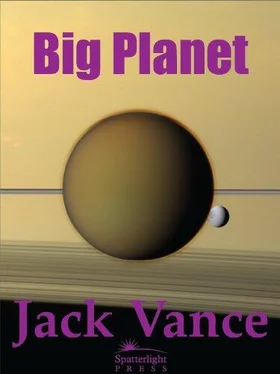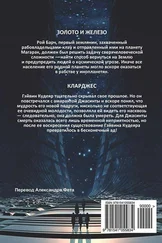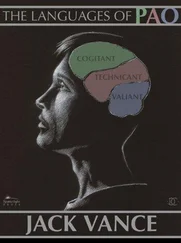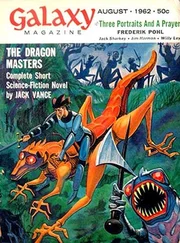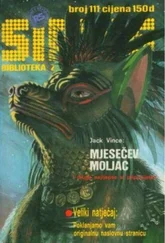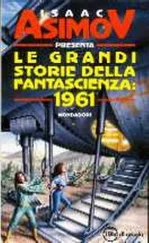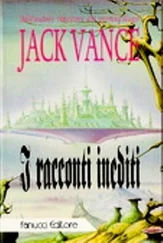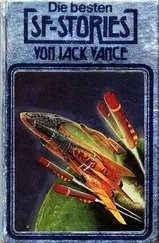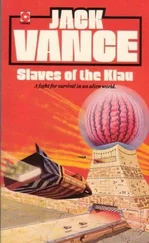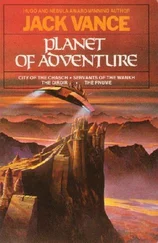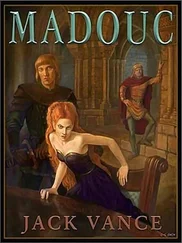To either side gullies draining the side areas opened. Glystra swerved to the left. “In here!” He was panting, in sympathy with the gasps of the zipangotes. “Quick! If we can lose them, we’ve got a chance…”
He plunged into the gully; behind came Nancy, pale, white around the mouth, then Bishop, then Corbus.
“Quiet,” said Glystra. “Back into the shadows—” He held his breath as if he could control the rattling sobs of his beast.
Thudding sounded out in the main watercourse. Black things hurled past the opening. War-calls sounded now loud, now dim.
There was a sudden slackening to the sounds, an ominous change of pitch. Galls vibrated back and forth— questioning tones, answers. Glystra turned, looking behind. The ravine sloped at a near-impossible angle up to a ridge.
Glystra beckoned to Nancy. “Start up the hill.” To Bishop and Corbus: “After her.”
Nancy kneed her mount. It moved, mumbled, stopped short at the slope, lowered its skull, tried to turn.
Nancy hauled the reins, kneed the beast desperately. Coughing and whimpering, it set its first pair of feet above its head on the slope, scrambled up.
“Quick!” said Glystra in a harsh whisper. “They’ll be here any minute!”
Bishop and Corbus followed… The yelling sounded closer. Glystra turned his mount up the slope. Steps sounded behind him, a snuffling. Silence. Then a cry loud and brilliant, the loudest sound Glystra had ever heard. From all directions came answering calls.
Glystra kneed his mount up the slope. Behind came the Rebbir, leaning forward with his sword out-stretched, waving it like an eager antenna.
The gully was choked with hot-eyed men and their horny black beasts. The steep slope was a mass of clawing legs, hulking shoulders.
Nancy breasted over the ridge, then Bishop, then Corbus, then Glystra.
Corbus knew what to do. He laughed, his white teeth shining. His ion-shine was ready. He aimed it at the first Rebbir zipangote, squeezed. The white skull-head shattered into a scarlet crush. The beast threw up its front legs like a praying mantis, poised briefly, swung gradually over backwards, fell into the beasts behind.
A tangle of writhing flesh. White skull-faces, despairing eagle-men, a horrid tangle at the bottom of the slope—a talus of hot jerking flesh, the horny bodies of the zipangotes, the softer sinews of men, clotted together like hiving bees.
Glystra whirled his mount, led the way along the ridge. They rode with all the speed left to their beasts, threading the line of the ridge past the incursions of gullies, ravines, gulches. Caves and blow-holes opened under their feet.
After five minutes Glystra turned down one of the gullies, halted behind a heavy wall of vitreous slag.
“They’ll be a long time finding us now, if they even bother to look… We’ll be safe until dark, at any rate.”
He looked down at the heaving shoulders of his mount. “You’re not much of a looker—but you’ve been quite a friend”
After nightfall they returned to the ridge and stole eastward through the dark. The ridge crumbled into rotten gray rock, disappeared under a dim ocean of sand.
As they started across the flat, from far behind came a call, an eerie hooting which might or might not have been human. Glystra halted his zipangote, looked up toward the Big Planet constellations, listened. Silence everywhere.
The zipangote shuffled its feet, snorted softly. The distant call came once more. Glystra shifted in his saddle, kneed the zipangote into motion. “We’d better put distance between us and the Rebbirs while it’s still dark. Or at least until we find concealment of some sort.”
They set off quietly across the glimmering sand. Glystra watched over his shoulder. A spatter of meteorites scratched bright lines down the sky. From far back came the mournful call once more.
Big Planet rolled on through space, twisting its shoulder back toward Phaedra. Dawn came, a pink and orange explosion. By this time the zipangotes were barely able to stumble and their heads swung on long necks, sometimes striking the ground.
The light grew stronger. A silhouette, low in the east, appeared—vegetation, waving fronds, bearded stalks, tendrils trailing from splayed branches.
Phaedra burst up into the sky. Plain to be seen now was an island of vegetation ten miles long in a white sea. From the center rose a hemispherical dome, glistening as of pale metal.
“That must be Myrtlesee,” said Glystra. “Myrtlesee Fountain.”
There was no area of transition. Desert became oasis as sharply as if a knife had trimmed away any extraneous straggles of herbage. Blue moss grew fresh and damp; an inch away the clay lay as dry and arid as any twenty miles to the west.
Passing into the cool gloom was like entering the Garden of Paradise. The air smelled of a hundred floral and leafy essences, damp earth, pungent bark. Glystra slid off his mount, tied the reins to a root, helped Nancy to the ground. Her face was pinched and white, Bishop’s long countenance was loose and waxy, Cx>rbus’ eyes gleamed like moonstones and his mouth was pulled into a thin pale line.
The zipangotes nosed and snuffled in the moss, lay down, rolled over. Glystra ran to remove the packs before they should be crushed.
Nancy lay at full length in the shade, Bishop slumped beside her.
“Hungry?” asked Glystra.
Nancy shook her head. “Just tired. It’s so peaceful here. And quiet… Listen! Isn’t that a bird singing?”
Glystra listened, and said, “It sounds very much like a bird.” A shadow crossed his face; he frowned, shook his head. He dismissed the odd idea which had suddenly been inserted in his mind. And yet—hmm. Strange.
Corbus opened the commissary pack, mixed vitamin concentrate with food powder, moistened it, stirred it into a heavy paste, scraped it into Cloyville’s cooker, squeezed down the lid, waited an instant, lifted the lid and withdrew a cake of hot pastry. He contemplated it gloomily. “If we ever get back to Earth I’m going to eat for a month. Ice cream, steak, apple pie, swiss cheese on rye with lots of mustard, strawberry shortcake, corned beef and cabbage, fried chicken, spare-ribs—”
“Stop it,” groaned Bishop. “I’m sick as it is…”
Glystra lay down on the moss. “Let’s hold a council of war.”
Corbus asked lazily. “What’s the problem?”
Glystra looked up into the blue-green foliage, tracing the white veins of a leaf. “Survival… There were eight of us that left Jubilith, not counting Nancy. You, Bishop, me, Pianza, Ketch, Darrot, Cloyville and Vallusser. Nancy makes nine. We’ve come a thousand miles and there’s only four of us left. Ahead of us is first of all more desert, the main part of the Palari. Then mountains, then the lake and the Monchevior River, then God knows what-all.”
“Trying to scare us?”
Glystra continued as if he hadn’t heard. “When we left Jubilith, I thought the chances pretty good that we’d all make it. Footsore, bedraggled—but alive. I was wrong. We’ve lost five men. Our weapons are just about done for. I don’t know whether I’ve got a charge left in mine or not. Big Planet is meaner and tougher than we allowed for. The chances are that we’ll be killed if we go on. So— now’s the time. Anyone who wants to return to Kirstendale on the monoline has my blessing. There’s metal enough in those Rebbir swords to make us all rich men. If any of you feel that you’d rather be a live Kirster than a dead Earthman—now’s the chance to make up your minds, and no hard feelings.”
He waited. No one spoke.
Glystra still looked up into the leaves. “We’ll rest here in Myrtlesee a day or so, and then—whoever wants to start east—” He left the sentence hanging in mid-air. His eyelids were heavy. The warm air, the cool shade, the soft moss, fatigue—all induced drowsiness. He aroused himself with a jerk. Bishop was snoring. Nancy was lying on her side. Corbus sat with his back to a tree, eyes half-closed.
Читать дальше
